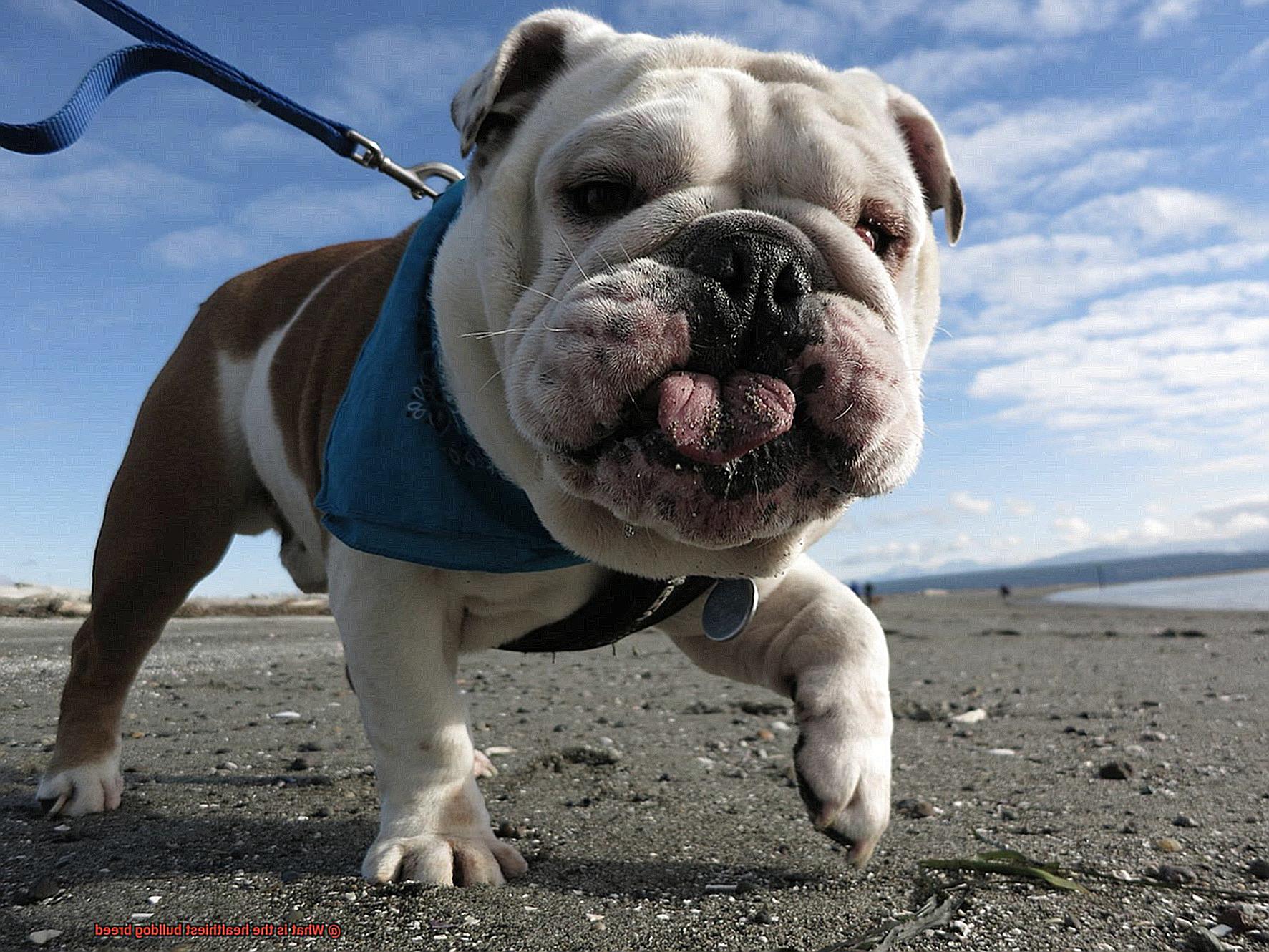What is the healthiest bulldog breed?
Bulldogs are undeniably charming and adorable, but unfortunately, they can be prone to certain health issues. But fear not.
Not all bulldogs are created equal when it comes to their overall health. In this article, we’re going to dive into the different bulldog breeds and uncover which one takes the crown for being the healthiest.
Get ready for some expert insights, fascinating facts, and personal stories that will shed light on the healthiest bulldog breed out there. Whether you’re a devoted bulldog lover or just looking to add a furry friend to your family, you won’t want to miss this must-read blog post.
So, let’s get started on our quest for finding the healthiest bulldog breed.
The Popular French Bulldog Breed
Contents
- 1 The Popular French Bulldog Breed
- 2 Common Health Issues in Bulldogs
- 3 Factors to Consider When Choosing a Healthy Bulldog Breed
- 4 The English Bulldog: Pros and Cons
- 5 American Bulldogs: Healthier than English Bulldogs?
- 6 Olde English Bulldogges: Better Than the Rest?
- 7 Victorian Bulldogs: A Healthy Choice?
- 8 Conclusion
With their adorable bat ears and compact size, it’s no wonder they’ve become beloved pets all around the world. But before you fall head over heels for these cuties, it’s crucial to understand their unique health concerns. In this informative blog post, we’ll dive into the potential health issues that French Bulldogs may face and provide you with practical tips to ensure your furry friend lives a healthy and happy life.
Brachycephalic Anatomy:
One of the most prominent health concerns for French Bulldogs is their brachycephalic anatomy. This refers to their flattened faces and shortened airways, which can lead to breathing difficulties and respiratory problems. Keep an eye out for signs of respiratory distress such as wheezing, snorting, or excessive panting. If you notice any of these symptoms, don’t hesitate to seek immediate veterinary attention.
Heat Sensitivity:
Frenchies are notorious for their intolerance to heat, thanks to their compromised airways. They struggle to regulate their body temperature efficiently and are at a higher risk of heat exhaustion or heatstroke. To keep your Frenchie cool and comfortable, provide plenty of fresh water, create a cool environment indoors, and avoid strenuous exercise during peak temperatures.
Allergies and Skin Conditions:
French Bulldogs are not exempt from allergies and skin conditions. They may develop allergic reactions to certain foods or environmental factors, leading to itching, redness, and discomfort. Regular grooming practices and a balanced diet tailored to their specific needs can help manage these conditions effectively.

Eye Problems:
Those adorable bug eyes are prone to injuries and infections in French Bulldogs. Regularly clean your Frenchie’s eyes with a damp cloth or sterile solution recommended by your veterinarian to prevent complications such as conjunctivitis or corneal ulcers.
Veterinary Check-ups:
Regular veterinary check-ups are vital for maintaining your French Bulldog’s overall health. These visits allow early detection of any potential health issues and ensure prompt treatment. Your veterinarian can provide guidance on vaccinations, dental care, parasite prevention, and other essential aspects of your Frenchie’s well-being.
Balanced Diet and Exercise:
A healthy diet tailored to your French Bulldog’s specific nutritional needs is crucial for their well-being. Consult with your veterinarian to determine the best diet plan for your Frenchie, considering their age, weight, and any specific dietary requirements. Additionally, while French Bulldogs may not require high levels of physical activity, regular short walks and playtime are important to keep them mentally stimulated and prevent obesity.
Common Health Issues in Bulldogs
Bulldogs are undeniably adorable with their wrinkly faces, stocky bodies, and playful personalities. But did you know that they are prone to a variety of health issues? Don’t worry, I’ve got you covered with some expert tips on how to prevent or manage these common health concerns.
- Respiratory Problems: Bulldogs have a unique anatomy with a short and flat face, which can cause breathing difficulties. This condition, known as brachycephalic syndrome, can lead to snoring, coughing, and difficulty breathing, especially during exercise or in hot weather. To help your bulldog breathe easier, make sure they have access to a cool and well-ventilated environment, plenty of water, and avoid overexertion on hot days.
- Overheating: Due to their short snouts and compromised airways, bulldogs are more susceptible to overheating. It’s crucial to keep them cool during hot weather by providing shade, fresh water, and avoiding intense physical activity. Consider using cooling pads or vests to help regulate their body temperature.
- Skin Problems: Bulldogs have wrinkled skin that can be prone to allergies, rashes, and infections. Regular cleaning and grooming can help prevent these issues. Be sure to clean those adorable face folds regularly to avoid the buildup of dirt and bacteria.
- Eye Problems: Bulldogs are prone to eye problems such as cherry eye (prolapsed gland), entropion (inward rolling of the eyelids), and dry eye. Regular eye exams by a veterinarian can help detect and manage these conditions early on.
- Joint Problems: Hip dysplasia and patellar luxation are common joint issues in bulldogs. These conditions can cause pain, lameness, and difficulty with mobility. Keeping your bulldog at a healthy weight, providing regular exercise, and a balanced diet can help reduce the risk of these problems.
- Cancer: Bulldogs have a higher risk of certain types of cancers, such as mast cell tumors and lymphoma. Regular check-ups with your vet and early detection are key to managing these conditions effectively.
- Obesity: Bulldogs love their food, and coupled with their low activity levels, they are prone to obesity. Obesity can lead to heart disease, diabetes, joint issues, and a host of other health problems. Keep an eye on their diet, provide portion control, and make sure to incorporate regular exercise into their routine.

Remember, prevention is always better than cure. Regular veterinary care and check-ups are essential for monitoring your bulldog’s health. Your vet may recommend specific diets or supplements to address any potential health concerns.

Factors to Consider When Choosing a Healthy Bulldog Breed
When it comes to choosing a healthy bulldog breed, there are several factors to consider. Bulldogs are adorable and lovable companions, but they are also prone to certain health issues. To ensure that you bring home a healthy and happy bulldog, here are some key factors to keep in mind:
- Genetic Health: Bulldogs, like many purebred dogs, can be prone to genetic health issues. It is essential to choose a breeder who prioritizes health testing and breeding for sound genetics. Look for a breeder who screens their breeding dogs for common health problems such as hip dysplasia, elbow dysplasia, and eye disorders. By selecting a breeder who focuses on genetic health, you can greatly reduce the risk of your bulldog developing hereditary health issues.
- Breathing Ability: Bulldogs have a unique facial structure that can lead to breathing difficulties. Their short snouts and flat faces make them brachycephalic breeds, which means they are more susceptible to respiratory problems. When choosing a healthy bulldog breed, look for puppies with well-opened nostrils and wider airways. This will help ensure that your bulldog can breathe more easily and avoid potentially life-threatening situations, especially during hot weather or vigorous exercise.
- Exercise Needs: Bulldogs are not typically known for their high energy levels, but they still require regular exercise to maintain their overall health and well-being. When choosing a healthy bulldog breed, consider your lifestyle and activity level. If you enjoy long walks or outdoor activities, you may want a more active bulldog breed that requires more exercise. On the other hand, if you prefer a more relaxed lifestyle, a breed with lower exercise requirements may be a better fit.
- Temperament: Bulldogs are known for their friendly and affectionate nature. However, individual dogs can have different temperaments based on their breeding and socialization. When choosing a healthy bulldog breed, consider the temperament that best suits your lifestyle and preferences. Some bulldogs may be more energetic and playful, while others may be more calm and relaxed. Take the time to meet both the parents and the puppies to get a sense of their temperament before making a decision.
- Maintenance: Bulldogs have specific grooming and maintenance needs that should be considered when choosing a breed. Their wrinkled skin requires regular cleaning and drying to prevent infections. Additionally, their short coat may shed moderately, requiring regular brushing to keep it healthy and free from mats. Some bulldog breeds may also require special attention to dental care and eye cleaning. Consider your ability to meet these maintenance needs when choosing a healthy bulldog breed.


The English Bulldog: Pros and Cons
If you’re thinking about adding an English Bulldog to your family, it’s important to weigh the pros and cons. As an expert in all things bulldog, I’m here to help you make an informed decision. So, let’s dive right into the advantages and disadvantages of owning an English Bulldog.
Pros:
- Friendly and Affectionate Nature: English Bulldogs are known for their love of cuddles and their friendly demeanor. They make excellent family pets and get along famously with children and other furry friends.
- Low Energy Level: If you’re not the most active person or you live in an apartment with limited space, an English Bulldog might be the perfect fit for you. They are content with short walks or play sessions and won’t demand hours of exercise.
- Moderate Appetite: Unlike some other breeds, English Bulldogs don’t have a ravenous appetite. They can easily be maintained on a balanced diet, making it easier to manage their weight.
- Calm Temperament: Need a dog that can handle apartment living? Look no further. English Bulldogs have a calm and patient temperament, making them ideal for smaller spaces. Plus, they’re not excessively vocal, so no worries about annoying the neighbors.
Cons:
- Breathing Difficulties: Due to their adorable pushed-in noses, English Bulldogs can have trouble breathing, especially in hot weather or during intense exercise. Heatstroke and respiratory problems can be a concern, so it’s important to keep them cool and avoid excessive exertion.
- Skin Infections and Allergies: Those cute wrinkles may require extra care. English Bulldogs are prone to skin infections and allergies, so regular cleaning and maintenance are necessary to prevent bacterial or fungal growth.
- Short Lifespan: Sadly, English Bulldogs have a relatively short lifespan compared to some other breeds. On average, they live around 8 to 10 years. It’s essential to consider the long-term commitment before bringing one into your family.
- Potential Veterinary Expenses: Because of their unique physical characteristics and potential health issues, English Bulldogs may require regular veterinary care. Be prepared for potential medical expenses and ongoing health monitoring.
In conclusion, the English Bulldog is a fantastic breed with many positive attributes, including their friendly nature, low energy level, and calm temperament. However, it’s crucial to be aware of their potential health challenges, such as breathing difficulties and skin problems. If you’re ready for the commitment and can provide the care they need, an English Bulldog could be the perfect companion for you.
American Bulldogs: Healthier than English Bulldogs?
If you’re in the market for a lovable bulldog breed, you may have come across American Bulldogs and English Bulldogs. While both breeds share a similar name, they differ greatly in terms of health. In fact, American Bulldogs are generally considered to be healthier than their English counterparts. Let’s dive into the reasons why.
Functional Body Structure
American Bulldogs have been bred with a more functional body structure, allowing them to lead a healthier lifestyle. Unlike English Bulldogs, which have been selectively bred for their distinctive appearance, American Bulldogs have a more athletic build with a longer snout. This longer snout allows for better airflow, reducing the risk of respiratory issues like brachycephalic syndrome, commonly found in English Bulldogs.
Reduced Genetic Disorders
American Bulldogs have a broader gene pool compared to English Bulldogs. This broader gene pool decreases the likelihood of inheriting genetic disorders commonly found in purebred dogs. While both breeds may be prone to certain hereditary conditions like eye problems, heart disease, and certain types of cancer, the overall prevalence of these conditions is lower in American Bulldogs due to their healthier genetic background.
Hip Dysplasia
Hip dysplasia is a common health issue in many dog breeds, including both American and English Bulldogs. However, American Bulldogs are less prone to hip dysplasia compared to their English counterparts. This genetic condition affects the hip joints and can cause pain and mobility issues. While responsible breeding practices can help reduce the risk, it’s important to note that individual dogs within each breed can still be affected.
Skin Issues
English Bulldogs are known for their excessive skin folds and wrinkles, which can trap moisture and bacteria, leading to skin allergies and infections. On the other hand, American Bulldogs have less pronounced facial wrinkles and are generally less prone to such skin issues. Proper care and hygiene practices can help prevent skin problems in both breeds, but the reduced severity of wrinkles in American Bulldogs gives them an advantage in terms of overall skin health.
Olde English Bulldogges: Better Than the Rest?
The Olde English Bulldogge has gained popularity in recent years for its reputation of being healthier than other bulldog breeds. But what sets them apart? Let’s dive into the research and explore why Olde English Bulldogges are considered better in terms of health.
A Longer Snout for Better Breathing
One of the main reasons why Olde English Bulldogges are considered healthier is their longer snout compared to other bulldogs. This helps alleviate breathing difficulties commonly seen in breeds with shorter snouts, such as French Bulldogs and English Bulldogs. With a longer snout, Olde English Bulldogges have improved airflow, reducing the risk of respiratory issues.
Fewer Skin Issues and Allergies
Olde English Bulldogges also have fewer skin issues and allergies compared to other bulldog breeds. Their coat is easier to maintain and requires less grooming. Say goodbye to constant itching, rashes, and skin folds that can trap moisture and bacteria. With an Olde English Bulldogge, you can enjoy a healthier and happier pup with less skin-related concerns.
Athletic Build for Overall Health
Another factor that contributes to the overall health of Olde English Bulldogges is their athletic build. These dogs are more agile and active compared to their counterparts, which helps prevent obesity and related health issues. Regular exercise is essential for their well-being, and their athletic nature makes it easier to keep them fit and in shape.
But Wait, There’s More.
While Olde English Bulldogges are generally healthier than other bulldogs, it’s important to note that they are not immune to all health problems. Like any breed, they can still be prone to certain genetic conditions or health issues that can be managed with proper care and regular veterinary check-ups.
In conclusion, if you’re looking for a healthier bulldog breed, Olde English Bulldogges should be at the top of your list. Their longer snout, fewer skin issues, and athletic build set them apart from other bulldogs. However, remember that no breed is completely free from health concerns. Regular exercise, a balanced diet, and proper veterinary care are essential for maintaining the health and well-being of any dog, including Olde English Bulldogges.
Victorian Bulldogs: A Healthy Choice?
When it comes to bulldogs, the Victorian Bulldog has been making waves as a potential healthier alternative to its English and French counterparts. But before you jump into adding one of these adorable pups to your family, it’s essential to understand the controversy surrounding their health.
The Perception of Healthier Breeds
Proponents of Victorian Bulldogs argue that they have fewer health issues compared to other bulldog breeds. They claim that these dogs experience less respiratory problems, skin allergies, and joint issues. This perception is partly due to the breeding practices used to create this specific breed.
Breeding Practices
To reduce the prevalence of genetic disorders, breeders have focused on selecting dogs with fewer health issues and breeding them together. This approach aims to improve the overall health of Victorian Bulldogs. However, it’s crucial to remember that even with careful breeding practices, there is still a risk of genetic disorders appearing in these dogs.
Varying Health Conditions
It’s important to note that the health of individual Victorian Bulldogs can vary greatly, regardless of breed. While some may be relatively healthy, others may still experience common bulldog health issues. Just like humans, dogs are unique individuals with their own set of genetics and predispositions.
Irresponsible Breeding Practices
Unfortunately, the popularity of Victorian Bulldogs has led to some breeders prioritizing profit over the health of the dogs. This has resulted in irresponsible breeding practices and an increased risk of producing puppies with health problems. It’s crucial for potential owners to thoroughly research any breeder they consider purchasing a Victorian Bulldog from.
Responsible Ownership
Regardless of the breed, owning any bulldog requires a commitment to regular veterinary care and attention to their specific needs. Proper diet, exercise, and routine medical check-ups are essential for maintaining their overall health and well-being.
3mJtcZFxC8E” >
Conclusion
In conclusion, when it comes to determining the healthiest bulldog breed, it is important to consider various factors such as genetic predispositions, exercise needs, and potential health issues.
While all bulldog breeds may have their own unique set of health concerns, the English Bulldog tends to be more susceptible to certain conditions such as respiratory problems and joint issues. On the other hand, the French Bulldog has a relatively healthier track record with fewer genetic problems compared to other bulldog breeds.
However, it is crucial to note that individual differences can still exist within each breed.




